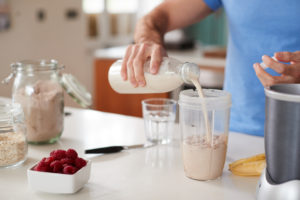 Protein might just be the most important thing you’re not eating. Some say that when it comes to nutrition, protein is king. The ancient Greeks seem to have thought so. The word proto means “first.”
Protein might just be the most important thing you’re not eating. Some say that when it comes to nutrition, protein is king. The ancient Greeks seem to have thought so. The word proto means “first.”
Why is protein the prized portion of human nutrition? Mainly because of all the processes it contributes to. It helps build and maintain muscle and strength, makes hair, blood, connective tissue, antibodies to keep you healthy, and more.
Advertisement
But intake can be highly controversial. Some suggest North Americans eat too much protein. Others contend people aren’t eating nearly enough. So, what should you do?
The recommended daily intake for protein is 0.8 grams (g) per kilogram (kg) of body weight. That amount will meet basic nutritional requirements, which means you’re not deficient. But eating more of it, particularly if you’re an older adult, may offer benefits.
Some suggest boosting that amount much higher, by about 50%, for older adults. The reason behind this thinking is that protein requirements go up with age as muscle loss (sarcopenia) and strength loss set in. Further, protein may work to prevent osteoporosis.
Boosting protein intake to these levels means getting between 1g and 1.3 g per kilogram of body weight, which brings up a rather important question: how are you going to get that much?
Most North Americans consume the bulk of their daily protein during dinner. The piece of chicken, fish, or beef on their plate is certainly a great source of protein, but you’re unlikely to hit targets with it. And it’s doubtful you’ll be doubling your portion.
Advertisement
Some experts suggest consuming protein throughout the day is the best way to hit targets and give your body a steady supply.
One thing to keep in mind with protein is where you’re getting it. Yes, red meat is an excellent source of protein, but it’s not something you want to eat every day. Therefore, looking for sources with low saturated fat is ideal. Some great sources include:
- Fish (tuna, salmon, etc.)
- Lean poultry (chicken/turkey breast; skinless chicken thighs, ground chicken/turkey)
- Lean meat (eye of round, filet, etc)
- Greek/Icelandic yogurt
- Whey
Looking at the other nutrients you’re getting with your protein is also important—it’s about the total package. Therefore, looking to plant sources like quinoa, nuts, beans, and legumes, are all excellent options to add to protein totals.
